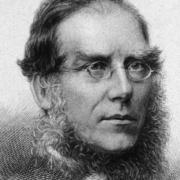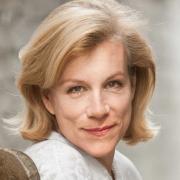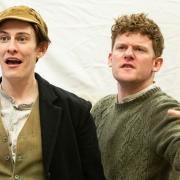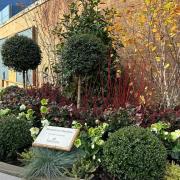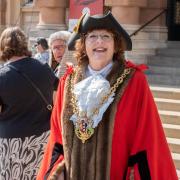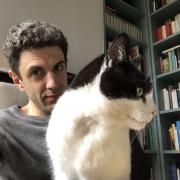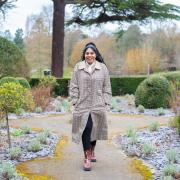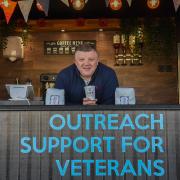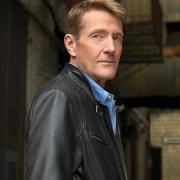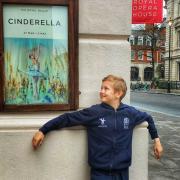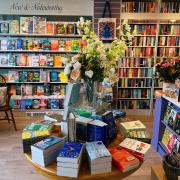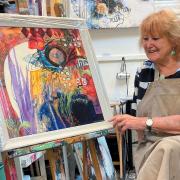Welcome to Rubensland, a fantasy world of humorous, thoughtful and thought-provoking sculpture.
Venturing into the world of Zoë Rubens it is rather like accompanying Alice into Wonderland. As I enter Rubensland, standing before me is a peacock, its magnificent tail splayed in greeting – except this extraordinary array of feathers is made up of forks, knives great and small, spoons and all sorts of other random bits of cutlery.
This metal creature is truly an exotic bird and typical of the highly intricate work created over the past couple of decades by Suffolk sculptor Zoë Rubens. Her much sought-after creations have been featured in countless solo exhibitions, group shows like those staged by Suffolk Craft Society and walking sculpture trails around the country.
Zoë's work is very distinctive. Although clearly still and sturdy, her creations fizz with energy and appear to have a life of their own. They have a tremendous presence, a distinctive character that manages to be quirky, humorous and also thoughtful.
Scattered around the workshop are several works in various stages of completion along with various random pieces of metal objects ranging from horse bridles, stirrups, car parts, more cutlery, hinges, door handles and other unidentifiable bits of metallic object d’art.
“You always get that bit of hell in every piece – that moment where you don’t know where you are going next, but that's when the magic happens,” she says.
Zoë works by recycling pieces of discarded metalwork that have been donated or that she has found in recycling centres or garages. For her, the scrap metal industry is a treasure trove – an Aladdin’s cave of potential wonders.

She sees life, she sees character in odd bits of scrap. A number of screws and bolts wait in a tidy pile on her work bench, next to her welding torch, ready to be attached to a large horse sculpture, a commission, which is two-thirds complete, and will form links to the bridle pieces and stirrups that will add detail to the flanks of the equine beauty.
“People tend to think I’m a bit chaotic but actually I am very organised. I know where everything is. I have drawers dedicated to straight nails, another for bent nails, then another for long screws, another for bolts, then another for short screws – so whenever I need anything I know exactly where to go.
“I think I take after my dad who has the most amazing collection of art books and if he needs to reference anything he knows exactly where to go, what book to pull out to get the illustration he’s after.”
Zoë's signature style appears to have been uncovered very early on but she's unsure whether it was consciously developed or whether it was just a natural expression of her visual representation of the world.
“People ask me how do I come up with the ideas for my sculptures and it’s really just my way of making sense of things. Sometimes I will see something, like the other day I saw I had a load of screwdrivers just hanging around, they were old, of no use, so I will find a way to incorporate them in a piece.
“Also, as my work has become recognised, over the last few years people will send me stuff to me with a suggested drawing and that’s fantastic because it brings an extra bit of magic to the work.”

Art is in her genes. Her father Maurice Rubens is an acclaimed theatre set designer who worked miracles for 20 years with Southwold Summer Theatre, among others; her mother, Ursula Ströh-Rubens, is an innovative ceramicist, and her sister, Sula, who lives and works in north Suffolk, is a highly regarded landscape artist.
Zoë's love of metalwork and sculpture means that the Rubens family have most of the artistic bases covered. Born in 1969, Zoe gained a first-class honours degree in sculpture from the Metropolitan University of Manchester in 1991 before heading off on a scholarship for further study in Barcelona and across Europe in 1995.

She recognises that her work has come a long way in the past 30 years and now she is in a position to realise the objects that she always wanted to build. She's always dreamed big. “When I was still at college, I put in an application for a sculpture commission. I suggested that I would make a fisherman, in a boat, with a mermaid. My tutors just laughed at me. Then the technicians took me aside and said ‘Why don’t you just do the mermaid? What you are suggesting is quite ambitious, at life-size’.
“I suppose I was quite naïve, but I've always tended to dream big and I always approach projects from a visual perspective. At that age you don’t have a clue until you get stuck in. At the end of the day, it’s all about experience. It’s a lot more fun now because I know what I'm doing, but it was always important to me for my work to have ambition.”
She loves putting detail into her work and can sometimes get side-tracked by the level of additional adornments. “I try and simplify my designs, but I always get obsessed with the details and I suppose that’s what gives my work its identity.”

When she went to art college in Manchester Zoë had no idea she could work in three dimensions. “I had no ambitions to be a sculptor at all when I was younger. I went to college as a painter. My mum said, ‘Be a painter you can always sell work as a painter,’ so although I come from an artistic family, they are quite sensible, quite grounded. But, when I got to Manchester, it was the university who suggested I go for the sculpture course because, as they said, ‘there’s loads of painters but there’s only 11 people doing sculpture - do that’. I swapped in my second year after having met and spoken to sculptors during a trip to Spain.
“When I started, I found I had a real aptitude for it. Obviously, I worked hard, but it didn’t feel like work because it was a pleasure and it has remained so.
“At college I used to get into trouble with how I worked. Our lecturer spent his entire budget on getting tutors and sculptors up from London and they used to tell me my work was two-dimensional. So I started doing double fronts to make them more interesting and having birds coming out of them - nobody seemed to notice. I know my visuals are a bit hyper, but people just accepted me as a figurative sculptor.”
When Zoë left university, she stayed in Manchester for a while before travelling abroad. She relocated to the south coast, then moved to The Fens for a while, before returning to Suffolk just over 20 years ago.
“I was living in The Fens, in the middle of nowhere, and I came back to Ipswich, to visit my parents, and it was like coming back to somewhere that I knew.”

Zoë lectured part-time at Suffolk College in Ipswich from 1994 to 1996, and at Anglia Polytechnic Cambridge from 1998 to 1999, while also working with bronze sculptor Laurence Edwards at Yew Tree Farm, Laxfield.
It was after leaving there that Zoe established her own workshop at the end of her garden. “It was finally being able to afford a house that gave me the confidence to really strike out on my own. Now, I just head down the garden after breakfast and get to work.”
Zoë's studio is her bolt hole away from the world but it’s also a place where she makes things that allows her to interact and communicate with the world. Her success suggests that people like what she is saying.
Her work is a combination of commissions and her own orginal ideas. “Sometimes, things start selling so I make some more. My bowls started to become popular, for example, and I did some more because it’s nice to have some money coming in. Then I got bored and did something else. Most recently my birds have attracted a bit of attention and so I looked at them and thought, yes, I’ve got some more in me.”
She still wants to make each piece different and isn't interested in mass producing identical sculptures – not that she could in her world of recycled bits and pieces. Commissions often arise out of people seeing examples of her work in exhibitions.
In addition to her metal sculptures Zoe has a love of drawing. All her sculptures are drawn out before she starts work, and she illustrates poetry as a ‘hobby’. When she returned to Ipswich in the early 1990s, she spent many Sundays wandering the streets just sketching the town, getting to know it again.
“If you go out early, you’re often the only one about. You can take your time and look around; you look up at the first and second floors and see the history of Ipswich laid out before you.”
Last summer Zoë appeared in joint exhibitions in Ipswich and Southwold and on various sculpture trails around the country. She's hoping the art world is finally starting to settle down after Covid.
“I always say art isn’t polite. You have to work through things – get out what is in your head. Things happen when they happen. The other day I had a list of things I needed to do but ended up making Octopus necklaces, really good necklaces. It was a good morning’s work but according to the list it wasn’t what I should have been doing. But octopus necklaces was what was in my head, and it needed to get out.”




